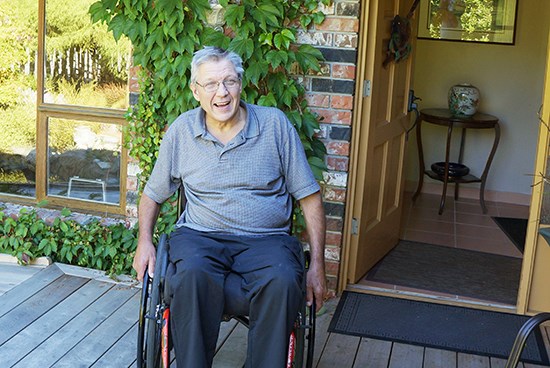Squamish’s Riun Blackwell would like to make the district a mecca for outdoor enthusiasts who are disabled.
Blackwell, 62, has always been a busy guy.
While raising his two sons, he was involved locally in Boy Scouts, Squamish Pirates Swim Club, the Squamish Masters Sport Society (now Squamish Titans) and initiated the Youth Triathlon – he was founding race director for its first years. These days, because his sons are grown up and he is less mobile due to multiple sclerosis, his pursuits are more cerebral: He writes and paints. But he still likes to get outside and hit the trails in his wheelchair.
He was the inspiration behind making the Mike Weeks Trail behind Garibaldi Highlands Elementary wheelchair accessible, according to the Squamish Trail Society’s John Harvey.
While Blackwell said that trail is not quite accessible yet, it is well on its way, and he would like to see more trails like it in Squamish.
“Looking at accessible trails as part of the outdoor features of Squamish,” he said. “It is really fun when you can get out into the woods and have that woods experience, and it wouldn’t take that much to do it.”
The Sea to Sky Gondola, he said, is a great attraction for the disabled, and an example of how it can be done. He sometimes heads up there to “bomb around” on a few of the trails, he said.
But a new public park in the University Heights neighbourhood near his home isn’t accessible, which doesn’t make sense, Blackwell said.
“There are steps that go up to the street above… that is a new park going in to a new neighbourhood that is not fully accessible,” he said, adding he would like to see accessibility as a standard for all new parks.
Donna Bent of Sea to Sky Community Services says the caregivers who have clients in wheelchairs tell her that there needs to be some friendly reminders in the community about making things accessible.
Sidewalks are an issue, she said. There are sometimes cutouts in the sidewalks with curb cuts that are not flat to the ground, so caregivers have to tip and haul their clients over the dip.
“Sometimes, with some of the people we support, they are in big wheelchairs that are quite heavy and also it is a behaviour thing. Some don’t actually like to be tipped back,” she said.
Sidewalks are often cracked, especially downtown, or limited, and sometimes things block the way, such as planters, overgrown greenery, snow or gravel, forcing those in wheelchairs to go out onto the road to pass – “which isn’t safe for them,” Bent noted.
Most people don’t mean to create inaccessibility issues, she said; it is often an oversight.
“You don’t know it is causing an issue unless someone tells you.”
Another issue is people who aren’t disabled using the wheelchair parking including film crews on Cleveland Avenue taking over the spots.
“When our staff needed to go… they pulled in and then the filming crew said, ‘You can’t park here because we are filming,’ so it is just not considered,” Bent said.
Both Blackwell and Bent mentioned Brennan Park Recreation Centre as a place where accessibility could be improved. Blackwell would like to see a complete and accessible weight room.
“I think it is the only pool in B.C. without a weight room,” he said.
Bent said there is not a lift system for the pool and due to liability issues, lifts that caregiver’s may have access to can not be used.
“That makes it really difficult for our folks to access the pool,” she said.
Roger Jones, an advocate for the disabled who is quadriplegic and lives in Burnaby, said issues around accessibility are where issues of race were before the civil rights movement.
“I am African-Canadian, so we wouldn’t think anymore, like in my parents’ time in my hometown, there were coloured only washrooms and separate entrances… no one would think of doing that today, in B.C. But yet I can go into a government building with steps,” he said. “For a person with disability here, we’re facing things that the civil rights movement to some extent took care of for people with African heritage.”
Jones said only a few provinces in Canada, such as Ontario and Manitoba, actually have good provincial legislation to create accessibility. Advocates are drawing attention to the issue in the current federal election campaign, according to Jones.
“You can’t legislate attitude, but it certainly goes a long way,” he said.
What communities and businesses don’t understand, he said, is that accessibility creates more than good feelings; there is money to be made by making a community or business accessible.
“I need to buy stuff. If you can make it easy for me to buy it, I am going to buy it,” he said.
Mayor Patricia Heintzman said she and council aim to make Squamish inclusive.
“Certainly… we want to make the town accessible for everyone, no matter what your physical disability might be,” she said, noting an accessibility advocate advises district staff on new developments’ accessibility.
Sidewalks are being retrofitted with drop-downs, she added. “Those are expensive projects, but we are slowly picking away at the curb drop-downs in the downtown area and really trying to make it so that people feel safe and comfortable.”
She doesn’t do a cost-benefit analysis on accessibility, she said. “You can’t evaluate it that way, because otherwise none of it will be built,” she said. “In order to create a compassionate society, or community that embraces everyone, you have to make sure you are doing those things, even though it is a very small portion of the population. It is the right thing to do.”



